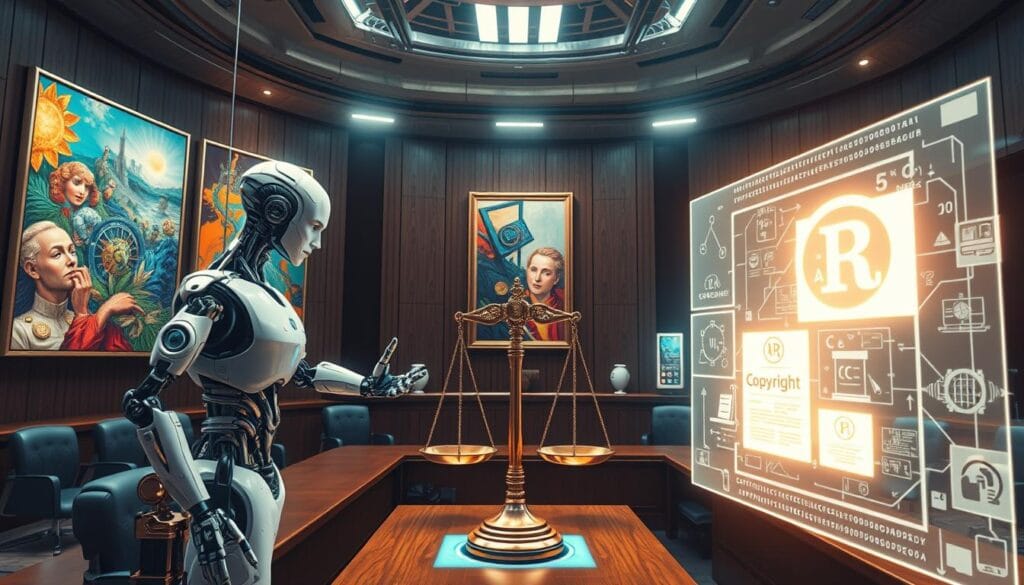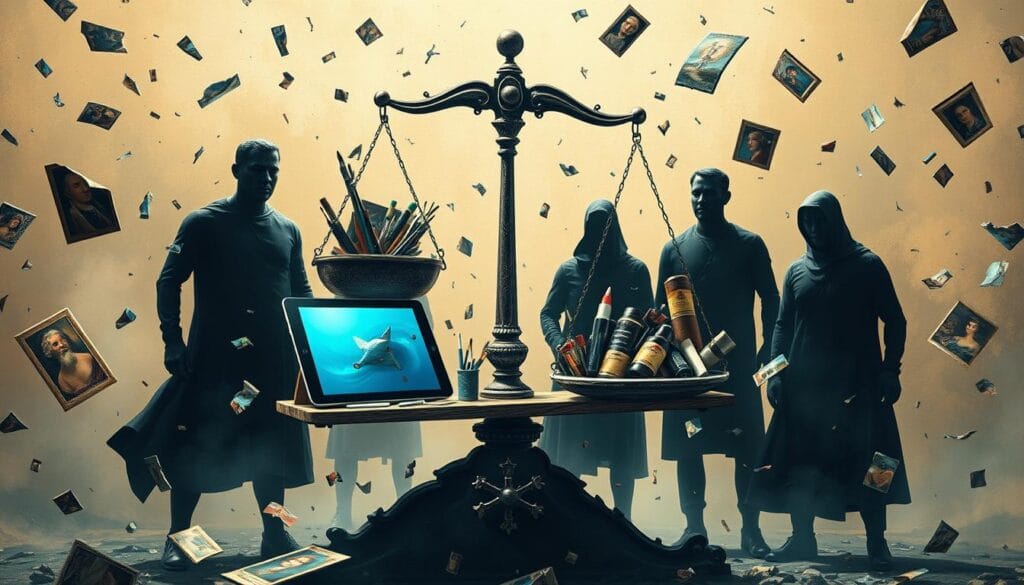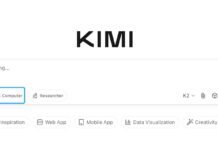In today’s world, creativity meets technology in AI-generated art. This has brought both wonder and worry. People are drawn to AI art’s endless possibilities, from stunning digital art to thought-provoking installations. Yet, as AI art becomes a way to earn money, questions about its legality arise.
The AI market is expected to hit $1,811.8 billion by 2030, showing its fast growth1. The sale of “Portrait of Edmond de Belamy” for $432,500 at auction sparked debates on AI art’s value and legitimacy2. It’s crucial to understand copyright and ownership in AI art, a topic of debate for artists and tech fans.
As AI art grows, knowing its legal side is key for those entering this field. Making money from AI art comes with its own set of challenges. It’s important for artists to learn about their rights and duties. This quest aims to answer a simple question: can you legally earn from AI-generated art?
The Rise of AI in the Art World
AI has changed how we make and enjoy art. Tools like DALL-E 3, Midjourney, and Stable Diffusion make creating art easy3. They use smart algorithms to create unique pieces that can be sold online4.
Understanding AI Art Generators
AI art generators have opened up the creative world. They help artists who found traditional media hard to use3. Now, art can cost just a few dollars on sites like Etsy3.
This makes art more accessible to everyone. It has sparked a lot of interest in AI art.
The Shift from Hobby to Business
Many are now turning their art into a business. The low cost of AI art has led to the rise of small art businesses4. Sites like DeviantArt and ArtStation help artists sell their work4.
AI art exhibitions and auctions show strong demand4. This has changed the art market, bringing new chances and challenges.
The Legal Landscape of AI-Generated Art

The fast growth of AI-generated art brings up big questions about copyright and who owns the art. In the U.S., only human-made works can be copyrighted. This means AI art doesn’t get legal protection5. This issue sparks debates on who should own AI art rights.
Legal experts suggest updating copyright laws to include non-human creators. This could change how AI art is viewed legally in the future5. In the UK, the person who commissions the AI art can own the copyright. This offers a different view for artists and users of AI tools5
Copyright Issues and Copyright Ownership
Debates on AI art’s legal status focus on who the author is. In the U.S., AI art is not protected by copyright because it’s not made by humans6. This creates big questions about who owns AI art.
Notable cases, like the U.S. Copyright Office’s decision on a graphic novel, show that only human parts of a work are protected6.
Impact of Current Laws on AI Art Creation
Current copyright laws affect how AI art is made and sold. For example, the New York Times sued OpenAI for copying articles word-for-word. This shows the ethical problems with AI-generated content6.
AI art also risks spreading false information, like AI hallucinations. To avoid legal problems, it’s important to fact-check and ensure AI is used openly6.
Is it legal to make money from AI generated art?
Selling AI-generated art legally is a unique spot in the art world. Many artists are making money, but the law is still unclear. This is because of copyright issues with AI art. Looking at famous cases helps us see how the law is changing.
Notable Cases and Precedents
“Portrait of Edmond de Belamy” by Obvious sold for $432,500. This sale made people talk about if selling AI art is legal. It also made them think about copyright issues. As more cases come up, lawsuits are trying to make the law clearer for selling AI art.
Big names in AI art, like Dall-e 3, Midjourney, and Stability, let you sell your art. They offer licenses to help with copyright worries. The U.S. Copyright Office says AI art might not get copyright unless a human helped make it7.
Artists need to think about the ethics of selling AI art, especially with copyrights. Using online platforms can help artists sell their work. It also gives them rules to follow, making it easier to succeed in the art world8.
As more people make AI art, knowing the law is key. It helps them make smart choices when selling AI art legally78.
Understanding Copyright Infringement

Copyright infringement is a big problem for creators of AI art. As AI tech gets better, knowing about copyright laws is more important. AI tools make new art but use old content that might be copyrighted.
This makes people worry about AI copyright law. It’s especially true when AI art looks like something already copyrighted.
Existing Copyright Laws and AI Art
In the U.S., copyright law only covers human-made works. This makes AI art’s legal status unclear9. A study found some exceptions for AI-made works. For example, the U.S. Copyright Office says you need to show humans helped make the art10.
In the UK, computers can get copyright protection under certain rules.
Potential Infringements and Risks
AI art faces more than just creation issues. Using copyrighted works to train AI raises legal questions. Experts say fair use might apply during training, but the AI’s output could still be seen as infringing10.
A case showed how AI can copy an artist’s style, making clear rules for AI art copyright are needed10. It’s key to understand how AI and human creativity mix to avoid legal problems.
Intellectual Property Rights in AI Art
Understanding intellectual property rights in AI art is key for creators. The debate on who owns AI art involves many, like those who input data and the algorithm developers. OpenAI’s DALL·E model, released in 2018, can create images in many styles and designs without clear instructions11. DALL·E 2, launched in 2022, can make edits that are realistic and context-aware, making the ownership issue even more complex11.
Who Owns the AI Art?
AI art ownership is a big challenge. Since AI-created works aren’t protected by copyright12, it’s unclear if human input makes them eligible for copyright. The U.S. Copyright Office has rules for protection, like originality and a fixed form, which AI art may not meet11.
Licensing Agreements and Permissions
Licensing agreements are crucial for artists using AI art. They must follow terms set by AI platforms, which might limit how they can use or sell their work. For example, using copyrighted materials in AI training is a legal gray area12. With lawsuits against AI companies on the rise, knowing these agreements is vital for protecting rights in AI art12.
The Complexity of AI Art Copyright
AI art and human creativity meet in a complex legal space. As AI art grows, knowing who created it is key. This question affects who owns the copyright.
Human Involvement in AI Art Creation
AI and humans work together in art, with clear lines between their roles. While AI makes the art, humans choose styles and make changes. This mix makes copyright laws tricky to apply.
Typical Legal Arguments Surrounding AI Art
Legal debates focus on if old copyright laws still apply with AI. Lawsuits are pushing courts to decide on AI art’s legal status. There’s a need for rules that protect creators and AI users alike.
Debates on AI and creativity also touch on creators’ rights. Without clear laws, artists struggle to safeguard their work in this new world131415.
How to Monetize AI-Generated Art
Artists are finding new ways to make money from AI art. They use *direct sales* and *licensing* to reach their goals. These methods fit different needs in the market.
Direct Sales Versus Licensing
Selling AI art on sites like Etsy, Redbubble, or Artsi is easy. It lets artists connect with fans directly. The online art market is growing fast, expected to hit $23.79 billion by 203016.
Some artists make a lot from their shops. For example, one Etsy seller made about €84.52k from animal posters17. Others license their art to brands. This way, they earn more while keeping their original work.
Using AI Art for Merchandise
Using AI art in *merchandise* is also a smart move. Artists can make unique items like clothes, home decor, or prints. These items appeal to many people.
Stores that use print-on-demand services show great success. One store made over €1.14 million selling historical artwork17. As AI art becomes more popular, adding it to merchandise can attract more fans. Artists should mix AI with their style to stand out18.
It’s important to be open about using AI in art. This builds trust with buyers. It also grows the market for AI art.
AI Art and NFTs: A New Opportunity
NFTs (non-fungible tokens) are changing the game for AI art. They let artists sell their digital art securely. This is thanks to blockchain tech, which proves ownership and authenticity.
As AI art gets more popular, NFTs are becoming a key way for artists to make money. For example, Roger Haus from Barcelona sold 100 AI artworks in just five days. He used the Foundation marketplace, a big name in NFT sales1920.
How NFTs Work for Artists
NFTs let artists create unique digital items to sell. Prices can change based on what buyers want and how much they’re willing to pay. Artists are getting creative with sales, like blind drops, where buyers get a surprise19.
These sales can be very profitable. Some artists make up to 3 ETH from one sale. Sites like OpenSea and Rarible help artists turn their AI art into NFTs. This way, more people can see their work21.
The Future of AI Art in the NFT Market
The future of AI art looks bright. More people, like collectors and designers, are interested in AI art. This includes marketing firms wanting to use AI art in their projects20.
Artists can also protect their work with licensing agreements. Being open about using AI in their art helps build trust. NFTs are making the art world more exciting for AI artists1920.
FAQ
Is it legal to monetize AI-generated art?
Who holds the copyright for AI-generated artwork?
How can artists safely sell AI-generated art?
What are the risks of copyright infringement in AI art?
What role do intellectual property rights play in AI art?
How does human involvement affect the copyright of AI-generated art?
In what ways can artists monetize their AI-generated artworks?
How can NFTs benefit artists creating AI-generated art?
Source Links
- Into the Legal Landscape: Is It Legal to Sell AI-Generated Art?
- Is It Legal To Make Money From AI Generated Art?
- Should You Be Allowed to Profit From A.I.-Generated Art?
- Can You Make Money With AI-generated Art?
- Is It Legal To Sell AI-generated Art?
- Can You Use AI Content Legally?
- Can you make money by selling AI-generated images? – Fabio Nodari
- Can You Sell AI Generated Art, Find if it’s Legal?
- Your Creative AI Copyright Questions, Answered | Superside
- The scary truth about AI copyright is nobody knows what will happen next
- Art-istic or Art-ificial? Ownership and copyright concerns in AI-generated artwork – Center for Art Law
- AI and Copyright Law: What We Know | Built In
- AI Training Data Dilemma: Legal Experts Argue For ‘Fair Use’
- ARTificial: Why Copyright Is Not the Right Policy Tool to Deal with Generative AI
- Can You Sell AI-Generated Art? Explained
- 9+ Simple Ways How To Make Money With AI Art (2024)
- How to Use AI-Generated Artwork to Make Money
- Selling AI Art in 2024: Legal, Ethical, & Practical Guide pen_spark
- Sell AI Art as NFTs in 2024 💰
- 6 Ways to Make Money With AI Generated Images 2024
- Can I Sell AI-Generated Art as My Own? | SEO Guide







